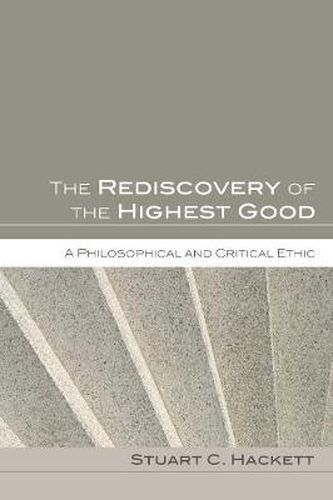Readings Newsletter
Become a Readings Member to make your shopping experience even easier.
Sign in or sign up for free!
You’re not far away from qualifying for FREE standard shipping within Australia
You’ve qualified for FREE standard shipping within Australia
The cart is loading…






This title is printed to order. This book may have been self-published. If so, we cannot guarantee the quality of the content. In the main most books will have gone through the editing process however some may not. We therefore suggest that you be aware of this before ordering this book. If in doubt check either the author or publisher’s details as we are unable to accept any returns unless they are faulty. Please contact us if you have any questions.
Stuart Hackett’s The Rediscovery of the Highest Good, originally handwritten in spiral notebooks, is a masterwork of philosophical ethics that guides readers through 2300 years of discourse on the issue of morality, from Plato through Kierkegaard and Nietzsche. It is the destiny of every human person to decide, Hackett opens. Whether our choices are genuinely free or inevitably determined, invariably trivial or occasionally momentous, carelessly settled or reflectively reasoned, at least in one sense all this makes no difference: for the one thing about which persons have no choice is that we unavoidably and necessarily must choose, and cannot therefore escape our responsibility to do so. From this matter-of-fact beginning, Hackett builds a coherent case for a modified teleological position while providing fleeting personal glimpses into his lifelong romance with philosophical contemplation. From the opening page, all the arguments are set down in a steady line of development, aimed unerringly toward a preconceived goal. At various points Hackett’s summations produce a cerebral satisfaction that could almost be described as aesthetic, a kind of sheer intellectual pleasure akin to beauty. Recovery of the Highest Good is the culmination of forty years of reflection from a theistic perspective and is likely to be an invaluable handbook for inquirers in future generations.
$9.00 standard shipping within Australia
FREE standard shipping within Australia for orders over $100.00
Express & International shipping calculated at checkout
This title is printed to order. This book may have been self-published. If so, we cannot guarantee the quality of the content. In the main most books will have gone through the editing process however some may not. We therefore suggest that you be aware of this before ordering this book. If in doubt check either the author or publisher’s details as we are unable to accept any returns unless they are faulty. Please contact us if you have any questions.
Stuart Hackett’s The Rediscovery of the Highest Good, originally handwritten in spiral notebooks, is a masterwork of philosophical ethics that guides readers through 2300 years of discourse on the issue of morality, from Plato through Kierkegaard and Nietzsche. It is the destiny of every human person to decide, Hackett opens. Whether our choices are genuinely free or inevitably determined, invariably trivial or occasionally momentous, carelessly settled or reflectively reasoned, at least in one sense all this makes no difference: for the one thing about which persons have no choice is that we unavoidably and necessarily must choose, and cannot therefore escape our responsibility to do so. From this matter-of-fact beginning, Hackett builds a coherent case for a modified teleological position while providing fleeting personal glimpses into his lifelong romance with philosophical contemplation. From the opening page, all the arguments are set down in a steady line of development, aimed unerringly toward a preconceived goal. At various points Hackett’s summations produce a cerebral satisfaction that could almost be described as aesthetic, a kind of sheer intellectual pleasure akin to beauty. Recovery of the Highest Good is the culmination of forty years of reflection from a theistic perspective and is likely to be an invaluable handbook for inquirers in future generations.